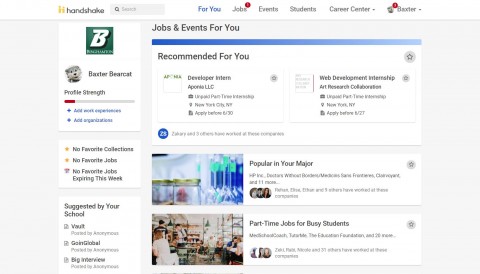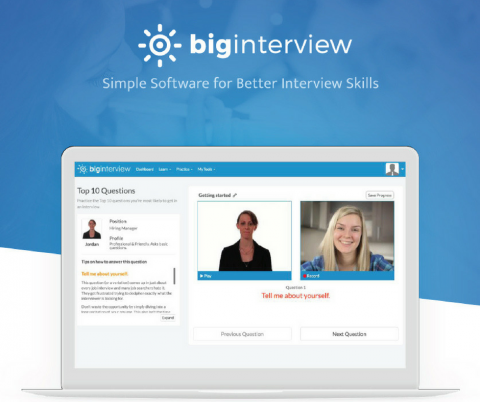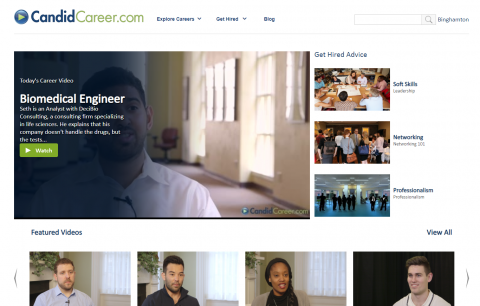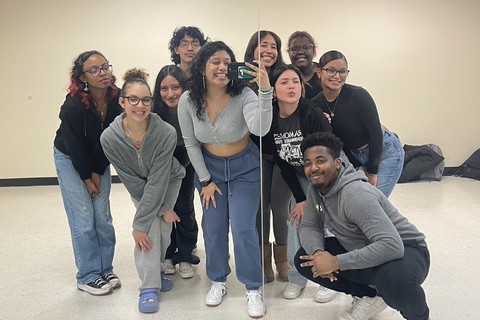The Fleishman Center can help you develop a successful job or internship search strategy. Our Career Consultants are available to review resumes and cover letters, conduct mock interviews, and provide advice on a variety of career-related topics. Each semester, representatives from a variety of for-profit, government and non-profit organizations are available to connect with students and discuss both full-time employment and internship opportunities at Binghamton University’s job and internship fair(s). Students of all majors and class years are encouraged to attend. Learn more about attending the job and internship fair.
Things to Consider when Searching for a Job or Internship
-
Industry Research
Before deciding on which types of jobs to apply for, you need to conduct a considerable about of research. While there are many ways to conduct this research, you can use BLS.gov to explore many types of jobs and careers, then look up jobs on a job search site like Indeed.com, Idealist.org, etc., then use LinkedIn.com/Alumni to explore what Binghamton University alumni are doing in certain jobs and reach out to ask them questions about their experiences. -
Job Function vs. Industry
While it is important to determine the type of job you want, it is equally as necessary to consider the industries in which you would like to do it. It is important to remember that many job functions/careers can fit into a variety of industries. For example, within the healthcare industry, professionals of all backgrounds are contributing to the success of the institutions, including accountants, analysts, doctors, nurses, therapists, HR, IT, marketing/communications, lawyers, management, researchers, social workers, technicians, chefs, dieticians, etc.To help you determine which industries you would like to work in, think about your interest areas outside your job function. -
Geographic Location
While job searching, it’s important to think about where you want to be geographically. This can help narrow your search and create a more targeted approach, which can help lessen your stress. Consider and research things like:- Urban vs Rural
- Climate
- Culture and History
- Cost of Living
- Concentration of Opportunities
-
Salary
When you’re thinking about salary, it’s important to consider several factors: What do you need? Think about cost of living in your chosen regions, any bills you have (including student loans), and housing expectations (including neighborhood, utility costs and amenities. Industry/position research: Explore sites like BLS.gov, Salary.com and Glassdoor.com to research starting salaries in specific geographic locations, then choose your acceptable range based on your previous experience and the industry (e.g. an accountant for a large multinational company may start much higher than someone with the same title at a small non-profit in the same region). Remember that job titles may differ significant between industries and organizations. Benefit packages: Review the benefits package to determine what is included and the value. These may include items such as: health care, life insurance, retirement contributions, paid time off, etc. -
Environment and Company Culture
Think about what’s important to you in a company culture, and what types of work environments you like best. Considerations may include:- • Inside/Outside
- • Stationary/Moving
- • Autonomous/Group
- • Recreation Options
- • Size of organization
- • Mission, vision and values
- • Management structure/style
- • Dress code
-
Organizing Your Search
When searching for jobs and internships, make a spreadsheet with organizations, position titles, position descriptions and application deadlines to stay on track (and so you don’t forget what you applied to!). Set aside time in your schedule to engage in your job search to avoid feeling overwhelmed by the process. Research your industry to determine when to start searching and applying for jobs (i.e accounting firms often hire in the fall). -
Evaluating, Negotiating and Accepting an Offer
When evaluating an offer, it’s best to speak with a Career Consultant or trusted mentor to discuss: Salary, benefits, sign-on bonus, moving costs, etc. -
Job / Internship Search Resources
- hireBING, Indeed.com, Idealist.org, etc.
- Local Job Boards
- Industry-specific Job Boards
- Professional Organization/Association Job Boards (Google organizations related to your industry of interest)
- Networking
- Conduct an advanced search to find additional resources
-
Earn Academic Credit for your Internship
The Fleishman Center offers the Career Development Centralized Internship (CDCI) program as a way for you to earn general, upper-level credit for your hands-on internship experience. Learn more -
Information for International Students
The Fleishman Center has compiled a variety of information and resources to help international students navigate the United States job search process. Learn more about the United States employment process, common cultural barriers faced by international students, immigration and legal processes, and more here. -
Student On-Campus Recruiting Policies
- Once a student has accepted a job/internship offer, students are not permitted to continue interviewing through on-campus recruiting. If a student is found to be interviewing when they have already accepted a position, employers with whom they are interviewing will be notified and the student’s hireBING account will be inactivated.
- Students who are currently on study abroad are instructed to notify an employer during the application process of their status. If a student who is studying abroad is selected for an interview, it is the student’s responsibility to notify the employer and the Fleishman Center at least five business days in advance of the interview so other arrangements can be made.
- Current Binghamton University students, who operate a business or serve as an employer, must consult with Employer Services staff prior to requesting use of any of the Fleishman Center’s employer services.
- Students who have a scheduled a job, internship, or mock interview or an appointment during employer office hours are required to give at least 24 hours (business day) notice if they are unable to keep the appointment. Students may cancel either call 607-777-2400 or send an e-mail to hireBING@binghamton.edu.
- A student who does not give 24 hours (business day) notice to cancel an interview or office hours, or who is a “NO SHOW” for the interview will have their hireBING account inactivated.
- Any student/alumnus who knowingly falsifies or misrepresents their academic or personal information on hireBING or within their resume will have their hireBING account inactivated and may be subject to campus judicial charges.
- A student/alumnus who has had their hireBING account inactivated due to violation of these policies must meet with a staff member from the Fleishman Center to discuss reactivation of their account.
- Please notify the Fleishman Center of any instances of unprofessional actions by an employer during the recruiting, interview, or employment stages. If you have any concerns about an employer’s conduct, please contact hirebing@binghamton.edu. The Fleishman Center will support you with notices of available resources, such as the campus legal clinic, and/or options and will work to maintain confidentiality to the best extent possible. If it is determined that an employer has violated one or more of our Fleishman Center Employer Policies, we will take action when necessary and possible.
- The Fleishman Center makes no representations or guarantees about the positions listed in hireBING. Students are advised to read all details provided carefully and thoroughly in order to make an informed decision before applying for any position within any organization. Please speak with a Fleishman Center staff member if you have any concerns about a position or organization listed.
-
Beware of Employment Scams Targeting College Students
Prevalence of employment scams has continued to increase over the past several years. Many of these employment scams specifically target college students which can result in financial loss or a stolen identity. Learn more about how to identify potentially fake job postings/scams, how to protect yourself from a scam and what to do if you fall for one.
















